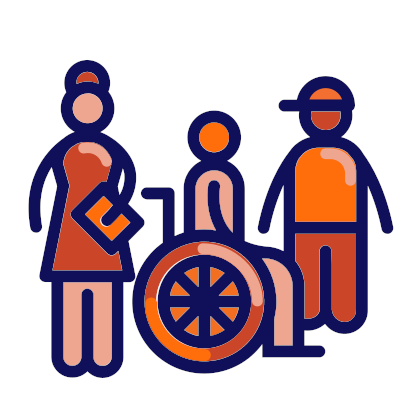Tackling discrimination

Schools can tackle discrimination by promoting democracy, respect for human rights and citizenship.
To ensure that all students’ needs are met equally, schools need to prioritise language and cultural competences, multiperspectivity in history and gender equality. In this way, students can acquire competences for democratic culture, to fulfil their potential in school as well as in society.
Facts & figures
Students with disabilities in Europe have higher early-school leaving-rates than their same-age peers.[1]
Black Caribbean students are three times more likely to be excluded from English schools than white pupils. [2]
A survey of nine EU countries showed that 33% of Roma students were in schools where most pupils were Roma, with 13% in Roma-only schools.[3]
What is discrimination?
Discrimination is treating a person badly or unfairly on account of a personal characteristic, such as national, ethnic or social origin, gender, language, religion, disability or sexual orientation.
There are two basic forms of discrimination:
- Direct discrimination – treating someone less favourably than you treat or would treat another person in the same situation, e.g., a school refusing to admit a student because they are Roma,
- Indirect discrimination – applying a provision, criterion or practice in the same way for all of a group which has the effect of unfairly disadvantaging people in the group who share a particular characteristic, e.g., a school uniform policy banning headgears for girls and boys may unfairly disadvantage Muslim girls and Jewish boys.
Discrimination can occur in almost any aspect of school life, from the attitudes and expectations of teachers to school rules and codes of conduct, selection and grouping practices, curricula, teaching methods and materials, changing facilities, career guidance, canteen food and the physical school environment.
Whatever form it takes – whether it be parallel school systems for different ethnic groups, concentrations of minority or disadvantaged children in the same school, or differential access to educational provision, it means a lower quality of educational experience for the students being discriminated against.
Why is tackling discrimination important at school?
Discrimination is a human rights violation. Article 14 of the European Convention on Human Rights contains a prohibition on discrimination with respect to any of the rights and freedoms guaranteed under the Convention. Article 2 of Protocol No.1 requires the state to ensure that all individuals have access to its formal educational provision.
“No person shall be denied the right to education.”[4]
“The enjoyment of the rights and freedoms set forth in this Convention shall be secured without discrimination on any ground such as sex, race, colour, language, religion, political or other opinion, national or social origin, association with a national minority, property, birth or other status.”[5]
Tackling discrimination is not simply a duty laid on schools by the European Convention of Human Rights, it is also important for student well-being and educational success. Children and young people who are treated unfairly or discriminated against are more likely to have:
- negative attitudes to school
- lower levels of motivation and academic achievement
- a higher risk of dropping out of formal education
- experience of bullying
- mental health problems.
Feeling different or ‘less’ than others can be an isolating experience. Over time it undermines an individual’s capacity for participation in society, e.g., their sense of self-efficacy, openness to other cultures and beliefs, tolerance of ambiguity and flexibility and adaptability - all of which lie at the heart of the Council of Europe Reference Framework of Competences for Democratic Culture.
Lack of opportunity due to discrimination in school also damages society. It intensifies social divisions, fuels xenophobia and intolerance and undermines social cohesion.
“States should adopt a combination of strong anti-discrimination measures and policies that promote more inclusive education systems where all children learn together. This is not a utopian project, but an achievable goal that can ensure more equal treatment of all children and, in the long term, improve social cohesion”[6]
What are the challenges?
One of the challenges facing the tackling of discrimination in schools is a lack of data. European-wide statistics specifically focused on discrimination in schools are scarce. Children with disabilities, for example, do not always appear in national statistics and may be ‘invisible’ to decision-makers, service providers and the public. Such children are particularly vulnerable to discrimination, however, and are often segregated in terms of educational provision.
These are not the only ‘invisible’ minorities in schools. For example, LGBTI students often feel they have to hide their sexual orientation at school to avoid victimisation.
Another key challenge is the existence of negative stereotypes about minority groups among teachers, parents, students and other school stakeholders. Such stereotypes are often deeply embedded in everyday school life and practice, so much so that they are taken as ‘normal’, e.g., stories and images in textbooks that reflect a stereotyped portrayal of the roles of women and men, girls and boys. Stereotypes help to fuel prejudiced and aggressive behaviour between students, lower expectations from teachers and negative attitudes from parents, e.g., refusing to allow their children to be taught alongside refugee or migrant children.
Stereotyping is difficult to root out in schools because its origins lie in wider society. This is exacerbated by the current preponderance of hate speech, fake news and conspiracy theories in digital media, especially social media.
The situation is compounded when minority groups are under-represented on school staff. Students lack role - models and teachers do not have the access to information about or insights into other cultures and ways of life that come with belonging to a more diverse profession. They lack the intercultural competences with which to create inclusive and quality learning environments, e.g., openness to cultural otherness, tolerance of ambiguity, plurilingual skills and knowledge and critical understanding of alternative cultures, religions and histories.
Tackling discrimination is more challenging when there is a lack of dialogue between schools and parents. Often this is on account of language difficulties, but it is also a problem where students’ parents work abroad leaving their children in the charge of elderly relatives or others.
How can schools get active?
Ensuring all learners of any age are provided with meaningful, high-quality educational opportunities alongside their peers requires a whole-school approach.
It begins by schools understanding who might be at risk of discrimination, what they can do to minimise discrimination and how they can support students at risk of discrimination. A good place to start is with an assessment of the current situation, identifying the strengths that exist in the school, but also needs and priorities. Consulting with school stakeholders is essential, especially students and, where possible, parents – e.g., using surveys, questionnaires, focus groups, etc. Given the sensitivities involved there is argument for collecting information on individuals’ experiences of discrimination anonymously.
Based on an assessment of the current situation it is possible to identify immediate priorities for policy development. Priorities will vary with the school, but might include, for example:
- language development
- gender equality
- accessibility of the physical environment
- intercultural competences.
The setting of initial priorities should go hand in hand with professional development for senior leadership teams as well as teaching staff. An element of personal as well as professional reflection is essential to the tackling of discrimination in school. In particular, it is important for school staff to be able to consider their own beliefs and values with regard to discrimination, including their own unconscious biases and prejudices.
Schools can then turn to the longer-term aspiration of creating a culture of non-discrimination. Central to this process is the challenging of negative stereotyping, both in classrooms and around the school. This can be done in a variety of ways, including:
- challenging stereotypes when they are heard
- discussing stereotypes with students
- identifying stereotypes in the curriculum
- highlighting stereotypical images and roles in textbooks
- allocating posts of responsibility equitably
- choosing different ways of dividing up students
- providing a range of role-models
- setting up mechanisms for monitoring incidents of discrimination.
Challenging stereotypes goes alongside the promotion of inclusion and an appreciation of the benefits of diversity in school life. This can take different forms, including:
- using inclusive language
- including human rights, democratic citizenship and intercultural education in the curriculum
- encouraging the discussion of controversial issues
- promoting student voice
- involving students in peer education and peer mediation activities
- welcoming parents and involving them in school decision-making
- forming partnerships with different organisations and groups in the community.
[1] Education section of the The European Disability Forum
[2] Article: UK: Racial discrimination is a reality in schools and classrooms. Education International
[3] EU Fundamental Rights Agency, “Second European Union Minorities and Discrimination Survey (EU-MIDIS II) Roma – Selected findings” (2017).
[4] ECHR, Article 2, Protocol No.1
[6] Position paper: Fighting school segregation in Europe through inclusive education by the Council of Europe Commissioner for Human Rights
 Resources on Tackling discrimination
Resources on Tackling discrimination
 Related schools projects
Related schools projects
Address: 1, Grigori Lambraki Street
Country: Greece
Project: New steps on an old path: Integrating Intangible Cultural Heritage and Competences for Democratic Culture in the daily teaching practice
 Working language during the project:
Working language during the project:
- Greek
- English
 Themes of the Council of Europe project “FREE to SPEAK, SAFE to LEARN - Democratic Schools for All” covered:
Themes of the Council of Europe project “FREE to SPEAK, SAFE to LEARN - Democratic Schools for All” covered:
- Addressing controversial issues
- Tackling discrimination
 Competences from the Reference Framework of Competences for Democratic Culture (CDC) addressed and where / how they were integrated:
Competences from the Reference Framework of Competences for Democratic Culture (CDC) addressed and where / how they were integrated:
- Knowledge and critical understanding of the world: politics, law, human rights, culture, cultures, religions, history, media, economies, environment, sustainability
By exploring in class and as part of the lesson the historical background and origins of the Rebetiko musical form (from war refugees) and its social background (the social position of women in the beginning of the 20th century in Greece) - Analytical and critical thinking skills
Examining the historical and social information from the Rebetiko era through projects on the lives of composers and singers and through creative writing activities related to the lyrics of the songs (gender stereotypes) to identify similarities and differences between the past and the present and to assist in making evaluative judgements - Autonomous learning skills
By providing students with various types of assessment forms at the end of each stage of the project to encourage self -reflection on what was learnt
 Target group age range:
Target group age range:
- 15 - 19
 Level of education:
Level of education:
- Upper secondary education
Short description of the project:
This experimental pilot project was developed in the framework of the joint UNESCO-European Union project “Engaging Youth for an Inclusive and Sustainable Europe” and focuses on the idea of integrating Intangible Cultural Heritage as a teaching tool to be used in the daily teaching practice of various upper secondary subjects , rather than as a topic for extra-curricular projects and activities, in order to cultivate respect, appreciation for diversity and democratic culture and to create a space for everyone to participate. This interdisciplinary educational scenario comprises four lesson plans for teaching four different subjects to students of A and B classes using the musical and cultural form Rebetiko from three different perspectives: to serve the aims and objectives of the national curriculum for those subjects, to explore the intangible cultural element itself, thus contributing to its safeguarding and to provide the background for integrating democratic competences of the Reference Framework of Competences for Democratic Culture in the daily teaching practice of curricular subjects.
Rebetiko is a form of musical and cultural expression directly linked to song and dance, inscribed on the Representative List of Intangible Cultural heritage of Humanity in 2017. After the exchange of populations (in 1922, the Greek-Orthodox living in Asia Minor were obliged to leave Turkey and Muslims to leave Greece), it became one of the primary musical expressions of the refugee groups that settled in most Greek urban centres, acting as a powerful reference point for collective memory and identity and expressing the plight of the refugees, who were uprooted by war or extreme economic distress. It is mainly a musical genre which, however, was also related socially to a specific “sub-culture” from the 1920’s to the 1950’s and was associated with a “bohemian” lifestyle and “emancipated” women. This was socially condemned and in the 1930s Rebetiko was censored rigorously as an expression of the “dangerous classes”.
The subject of English as a Foreign Language was used to familiarise students with the historical origins and social background of Rebetiko, based on the English version of the formal application text by the Greek Ministry of Culture. Through KWL charts, reading activities and guided discussion during the lesson and by researching the life of composers and singers at home, students learnt about war refugees, immigrants, social inclusion and gender stereotypes. They also attended a special screening of three ethnographic documentaries in the framework of the Ethnofest, followed by an interview-discussion with an expert of the Ministry of Culture regarding knowing and understanding of one’s own cultural affiliations and sensitivity towards cultural diversity.
Using creative writing techniques to initiate guided group and class discussion, the subject of Greek Literature focused mainly on the social position of women in the (conservative) Greek society of the time and the completely different type of (emancipated) women portrayed in the lyrics of 3 popular Rebetiko love songs, thus exploring gender stereotypes and allowing for understanding of the relevance of the past to issues of the present.
The evaluation methods used included KWL charts and 3,2,1 report sheets to allow for self-reflection in the framework of autonomous learning.
In order to foster the insight gained, B class students learned the steps of the three main Rebetiko dances in their Physical Education class, practicing the cultural element itself, connecting the historical and social origin of the songs to their actual artistic expression while enhancing their self-efficacy. In their ICT class, as part of the A class syllabus, students cooperated seamlessly and developed the Rebetiko application for mobile phones to document and disseminate the pilot project.
 Aims/objectives
Aims/objectives
To explore the intangible cultural element itself and to contribute to its safe guarding, as it is local to the area where the school is situated, and to integrate it in the daily teaching practice of curricular subjects to serve their aims and objectives while increasing their relevance.
To provide the background (war refugees, gender stereotypes) for integrating democratic competences of the Reference Framework of Competences for Democratic Culture in the daily teaching practice of curricular subjects, such as valuing cultural diversity, respect, civic mindedness, understanding how our perspective of the world is contingent upon our cultural affiliations and experiences, autonomous learning skills, analytical and critical learning skills.
 Expected results/outcomes
Expected results/outcomes
- To further foster the cooperative school culture
- To enhance Communication, Collaboration, Creativity and Critical Thinking among both teachers and students
- To develop flexibility and adaptability as well as self-efficacy among both teachers and students
 Changes
Changes
Both the teachers and the students enjoyed these “different” lessons which made use of a different teaching “tool” and approach, as opposed to the norm (knowledge and teacher cantered teaching) due to time constraints at upper secondary level schools. This teaching approach initiative has remained in the school culture and is currently being used not only in designing lesson plans for classroom use but also, due to its modular nature, in designing extracurricular activities of various kinds initiated in and/or closely linked to the classroom practice (Erasmus+ projects, environmental and cultural programmes). In this way, both the curricular aims and the CDC competences are equally taken into account at the planning level, contributing to a more holistic approach towards teaching and learning.
 Challenges you faced
Challenges you faced
Not all of our students come from the area around the school, but from various suburbs of Peiraeus and even municipalities around Athens. Their cultural, social and financial backgrounds vary a lot and some students were at first apprehensive of dealing with Rebetiko, especially in their English class, since, as they said, they could see no relevance and found the musical genre old fashioned. During the project, their evaluation sheets made it clear that the vast majority had enjoyed and appreciated the project.
 Time-frame of the project:
Time-frame of the project:
implementation time frame of the project was one and a half months for all four subjects. Nevertheless, due to the project’s modular nature, time frames may vary depending on the subject or the extracurricular activity or programme for/in which it is used.
 Council of Europe materials on citizenship and human rights education used while preparing or implementing your practice:
Council of Europe materials on citizenship and human rights education used while preparing or implementing your practice:
- Reference Framework of Competences for Democratic Culture







